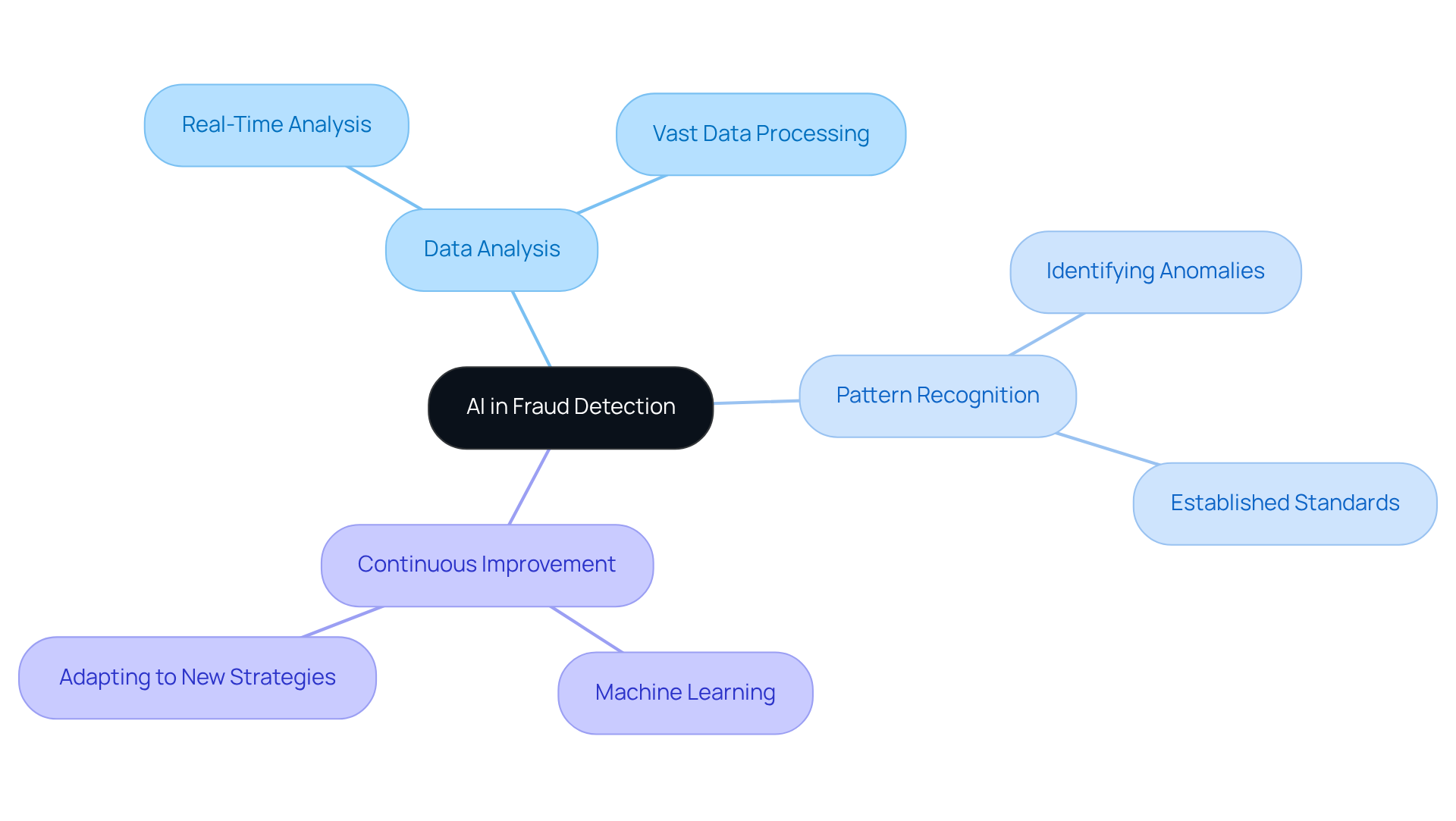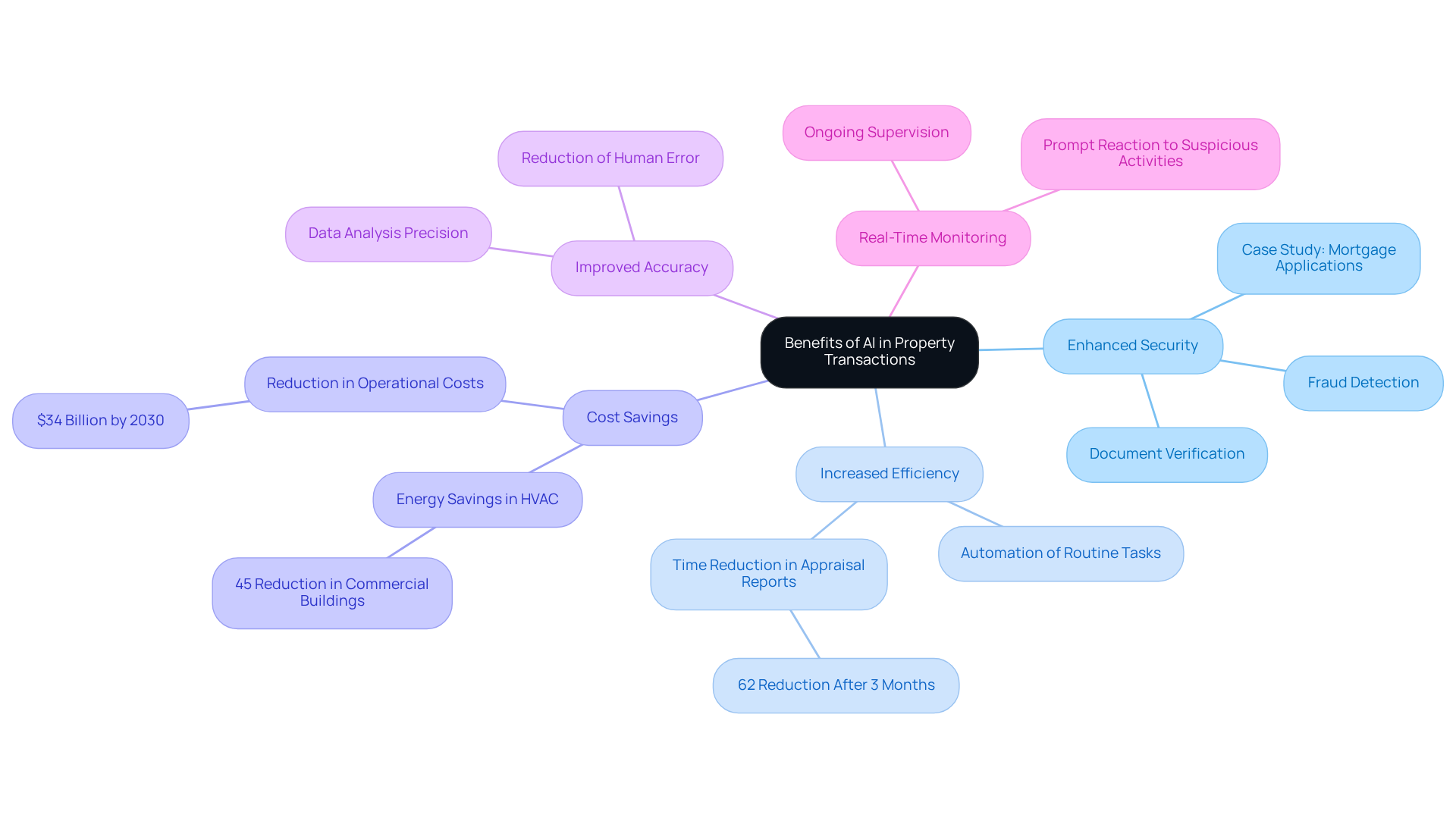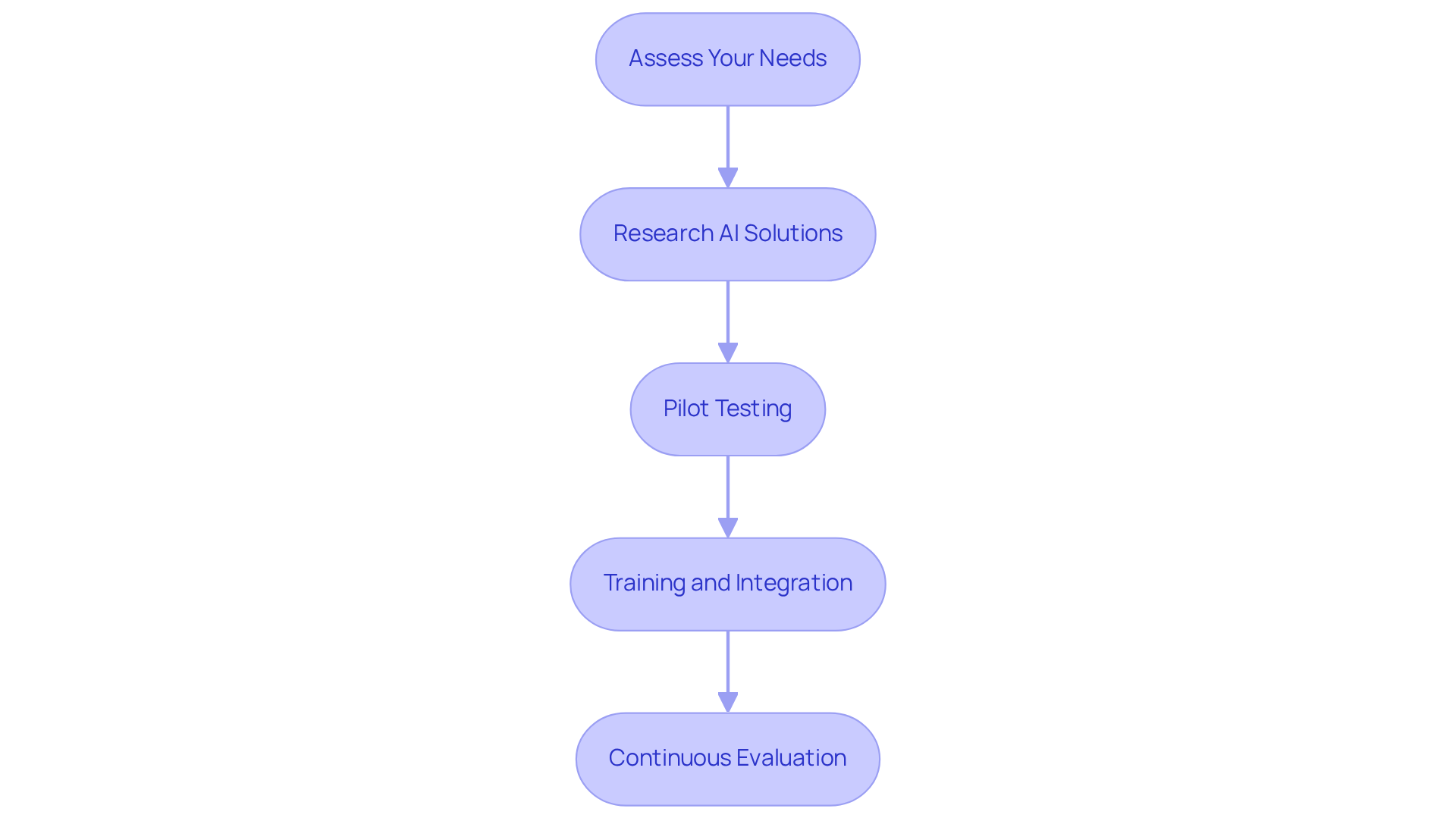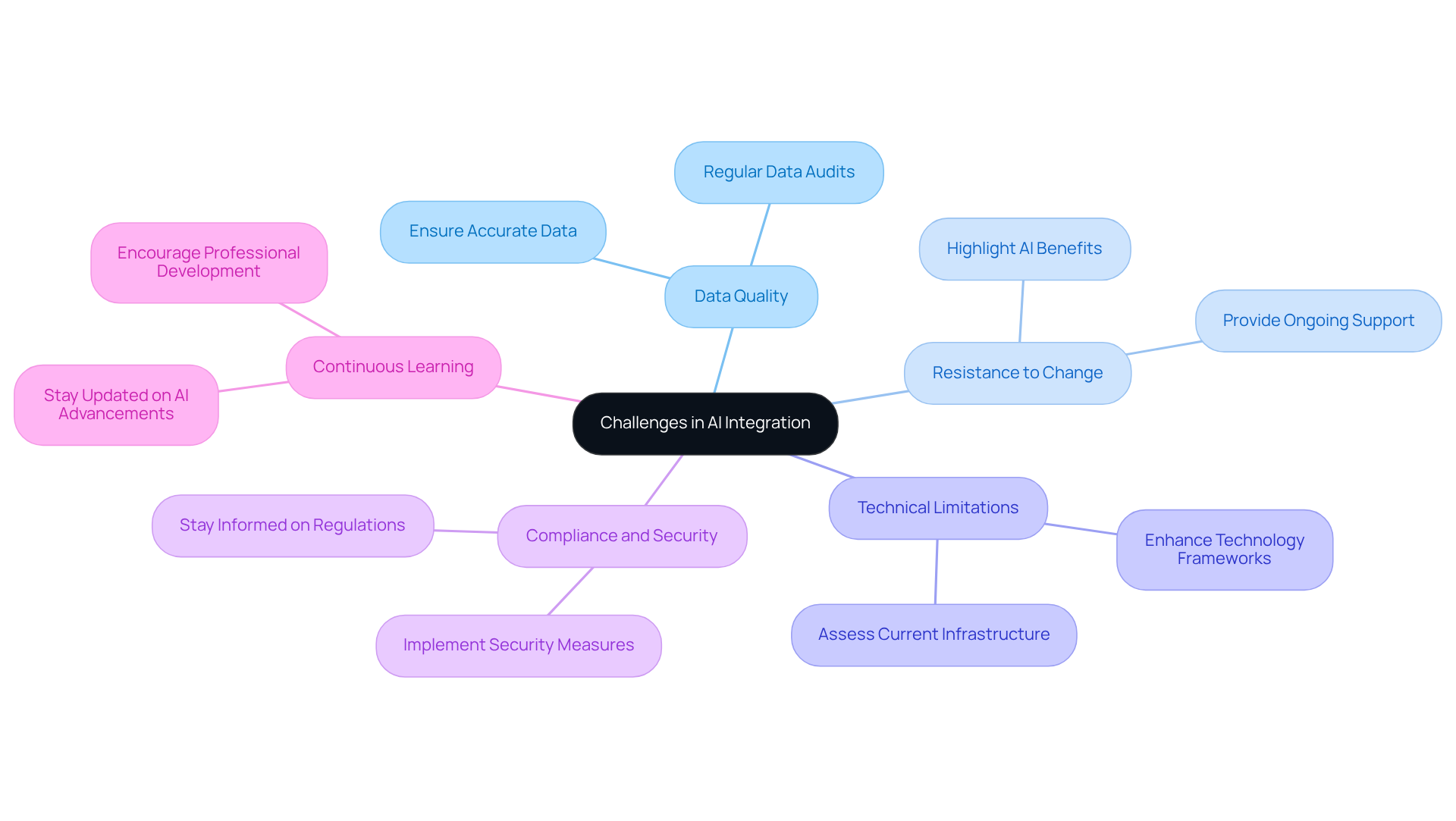Overview
AI significantly reduces fraud in property deals by employing advanced algorithms that analyze data in real-time. This technology identifies patterns and anomalies indicative of fraudulent activities, thereby enhancing the integrity of transactions. For instance, AI's capabilities in detecting discrepancies in property records not only bolster security but also improve efficiency and accuracy. Consequently, this fosters a more trustworthy real estate environment, addressing the pressing need for reliable solutions in property transactions.
Introduction
The rise of artificial intelligence is reshaping industries, with real estate standing out as a notable example. As property transactions grow increasingly complex, the potential for fraud intensifies, creating an urgent need for innovative solutions. This article explores the transformative role of AI in fraud detection within property deals. Advanced algorithms not only identify suspicious activities but also enhance security, efficiency, and accuracy in transactions. Furthermore, as AI technologies evolve, stakeholders face significant challenges in effectively integrating these tools to combat fraud.
Understand AI's Role in Fraud Detection
AI plays a transformative role in fraud detection, demonstrating how AI reduces fraud in property deals by utilizing advanced algorithms to analyze vast amounts of data in real-time. These frameworks recognize patterns and anomalies that may indicate deceptive activities, such as unusual conduct in exchanges or inconsistencies in property ownership records.
For instance, AI can identify activities that diverge from established standards, enabling real estate experts to conduct further examinations before proceeding. Furthermore, by employing machine learning, AI systems continuously enhance their detection abilities, adapting to new deceit strategies as they emerge.
This proactive approach significantly demonstrates how AI reduces fraud in property deals, thereby ensuring a more secure environment for all parties involved.

Identify Benefits of AI in Property Transactions
The integration of AI in property transactions presents a range of significant benefits:
-
Enhanced Security: AI systems proactively detect fraudulent activities, showcasing how AI reduces fraud in property deals and significantly lowering the risk of financial loss. AI algorithms can examine property documents and deal records to identify discrepancies, assisting stakeholders in avoiding poor agreements. A notable case study highlights how AI reduces fraud in property deals by effectively detecting fraudulent mortgage applications, thereby preventing significant financial losses.
-
Increased Efficiency: By automating routine tasks such as document verification and transaction monitoring, AI enables real estate professionals to concentrate on strategic activities. This shift allows for quicker decision-making and improved client service. A study found that AI can reduce the time spent on appraisal reports by 62% after three months of use, showcasing its efficiency.
-
Cost Savings: AI minimizes the time and resources traditionally spent on manual fraud detection processes. Studies indicate that AI can reduce operational costs in real estate by up to $34 billion by 2030, showcasing its potential for long-term financial benefits. Additionally, AI-driven systems have demonstrated a 45% reduction in HVAC energy use in commercial buildings, further illustrating cost-saving capabilities.
-
Improved Accuracy: AI algorithms analyze data with remarkable precision, significantly reducing human error. This guarantees that property ownership records are precise and current, which is essential for sustaining confidence in real estate dealings. As Dennis Riccio, President of the Central Arizona Association of REALTORS®, stated, "AI brings unprecedented speed and accuracy to a traditionally slow-moving industry, freeing us up to focus on negotiation and service."
-
Real-Time Monitoring: AI tools provide ongoing supervision of activities, enabling prompt reactions to dubious behaviors. This capability is especially crucial in fast-paced real estate settings, where prompt action can avert possible deceit.
Through these advancements, AI not only improves safety in real estate dealings but also showcases how AI reduces fraud in property deals, ultimately resulting in a more efficient and trustworthy industry.

Implement AI Tools for Fraud Prevention
To effectively implement AI tools for fraud prevention in property transactions, consider the following steps:
-
Assess Your Needs: Begin by identifying specific areas within your transaction processes where risk factors are most pronounced. Determine how AI reduces fraud in property deals and effectively addresses these vulnerabilities.
-
Research AI Solutions: Investigate the various AI resources available in the market. Focus on those that specialize in understanding how AI reduces fraud in property deals within real estate. Key features to look for include real-time monitoring, anomaly detection, and seamless integration capabilities with your existing systems.
-
Pilot Testing: Before full-scale implementation, conduct a pilot assessment using the selected AI resources. This will allow you to evaluate their effectiveness in your specific environment. Monitor relevant performance metrics to understand how AI reduces fraud in property deals and gauge their impact on detection rates.
-
Training and Integration: Provide comprehensive training for your team on the effective utilization of the AI resources. It is crucial to ensure that these tools are integrated seamlessly into your current workflows to maximize their potential.
-
Continuous Evaluation: Regularly review the performance of your AI tools, making adjustments as necessary. Stay informed about new advancements in AI and how AI reduces fraud in property deals, along with evolving fraud tactics, to ensure that your systems remain effective.

Navigate Challenges in AI Integration
Integrating AI into property transactions presents several challenges that require strategic navigation. Here are essential strategies to overcome these obstacles:
- Data Quality: It is crucial to ensure that the data used for AI training is accurate and comprehensive. Poor data quality can lead to ineffective AI models. Regular audits of data sources are necessary to maintain integrity.
- Resistance to Change: Some team members may hesitate to adopt new technologies. To foster a culture of innovation, highlight the benefits of AI and provide ongoing support and training.
- Technical Limitations: Assess your current technology infrastructure to confirm it can support AI tools. Enhancing frameworks may be essential for seamless integration.
- Compliance and Security: Stay informed about legal and regulatory requirements related to data privacy and security. Implement robust security measures to protect sensitive information processed by AI systems.
- Continuous Learning: AI technologies evolve rapidly. Encourage your team to engage in continuous learning and professional development to understand how AI reduces fraud in property deals and stay abreast of the latest advancements and best practices in AI fraud detection.

Conclusion
AI's integration into property transactions signifies a pivotal advancement in fraud detection, fundamentally transforming how real estate professionals protect their dealings. By harnessing sophisticated algorithms and machine learning capabilities, AI not only identifies patterns indicative of fraudulent behavior but also evolves continuously to counter emerging threats. This proactive approach ensures that stakeholders navigate property deals with enhanced security and confidence.
The article delineates several key benefits of AI in real estate:
- Heightened security through real-time monitoring
- Increased efficiency via automation of routine tasks
- Substantial cost savings
- Improved accuracy in data handling
- The ability to respond swiftly to suspicious activities
Each advantage underscores how AI effectively mitigates fraud in property deals, paving the way for a more trustworthy and efficient industry.
In light of these insights, embracing AI technologies is not merely an option but a necessity for those involved in property transactions. As the real estate landscape continues to evolve, staying informed about AI advancements and implementing robust fraud detection systems can significantly mitigate risks. The call to action is clear: prioritize AI integration to foster a secure environment in property transactions, ensuring that both buyers and sellers can engage with peace of mind in their dealings.
Frequently Asked Questions
How does AI contribute to fraud detection in property deals?
AI contributes to fraud detection in property deals by utilizing advanced algorithms to analyze large amounts of data in real-time, recognizing patterns and anomalies that may indicate deceptive activities.
What types of anomalies can AI detect in property transactions?
AI can detect unusual conduct in exchanges and inconsistencies in property ownership records, which may indicate potential fraud.
How does AI help real estate experts in fraud detection?
AI helps real estate experts by identifying activities that diverge from established standards, allowing them to conduct further examinations before proceeding with transactions.
In what way does machine learning enhance AI's fraud detection capabilities?
Machine learning enhances AI's fraud detection capabilities by allowing AI systems to continuously improve their detection abilities and adapt to new deceit strategies as they emerge.
What is the overall impact of AI on fraud in property deals?
The overall impact of AI on fraud in property deals is significant, as it reduces fraud and ensures a more secure environment for all parties involved.




